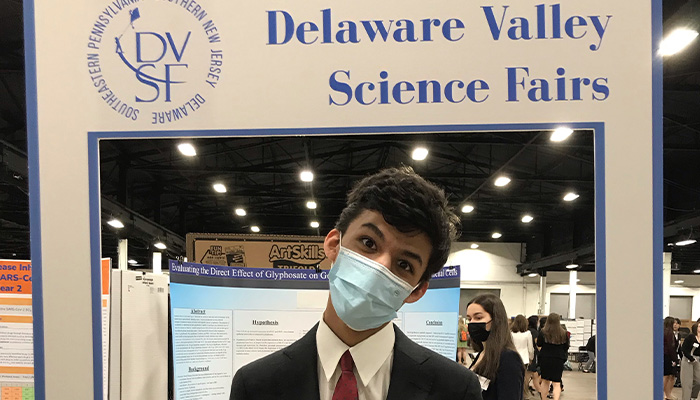HOW CAN WE HELP YOU? Call 1-800-TRY-CHOP
In This Section
CHOP Intern Earns Two First-Place Awards for Research

Erik Hagen, a high school intern, took home two first-place awards for research he conducted while at CHOP. Science Fair Winner
shafere1 [at] chop.edu (By Emily Shafer)
It is critical for high school students to have exposure to sophisticated science labs to help them seek out additional opportunities in college and beyond. In a new partnership between the Office of Academic Training and Outreach Programs with Central High School of the School District of Philadelphia, three students selected by their teachers conducted research at Children’s Hospital of Philadelphia Research Institute for the 2021-2022 academic year, with the goal of presenting their projects in city- and state-wide science fairs.
Erik Hagen’s year of hard work in the lab paid off when he won not one, but two first-place awards for his scientific research, at the George Washington Carver Science Fair and the State Meeting of the Pennsylvania Junior Academy of Science.
“One of the greatest skills I learned through this project was persisting in the face of uncertainty and adversity,” Hagen said. “That’s the beauty of science — you can never fully anticipate what might happen. While it’s great to have won these awards, what I value most is the actual lab experience. Coming from a Philly public school, we don’t get many opportunities like this.”
Hagen worked in the lab of Kathryn Hamilton, PhD, a principal investigator who studies intestinal epithelial stem cells. His winning project — The Impact of Glyphosate on Cellular Function in the Intestinal Epithelium — examined the effect of glyphosate, a widely used herbicide, on intestinal gene expression and its relevance in patients with inflammatory bowel disease. He exposed colon organoids to varying amounts of glyphosate and evaluated how particular genes were affected. The preliminary data suggest that glyphosate does change the expression of various genes.
Dr. Hamilton is thrilled that Hagen won the science fair awards, noting that they spent significant time working not only on his scientific development but also his scientific presentation skills, which are also critical for scientific success.
“Having high school students like Erik in the lab is an opportunity for scientists in my group to develop their teaching skills. We focus on teaching the fundamentals of working in a research lab, sharing the joy of discovering new knowledge for the first time, and helping students develop the resilience required to overcome experimental setbacks,” said Dr. Hamilton, who also is an assistant professor of Pediatrics at the University of Pennsylvania.
This fall, Hagen started college at the University of Delaware, where he’s majoring in insect ecology and conservation. Fascinated with insects since he was 6 years old, Hagen thinks they are woefully understudied despite their importance in the ecosystem. He hopes to continue to graduate school to further his education in entomology, possibly exploring mycology or botany, too.
“I am lucky to have had this experience at CHOP, and I could think of no better place to help ease me into lab work before starting college,” Hagen said. “Everything I’ve learned — from fundamental organizational skills to lab safety to pipetting gel for cell cultures into a petri dish — will be incredibly useful for me in the years to come.”